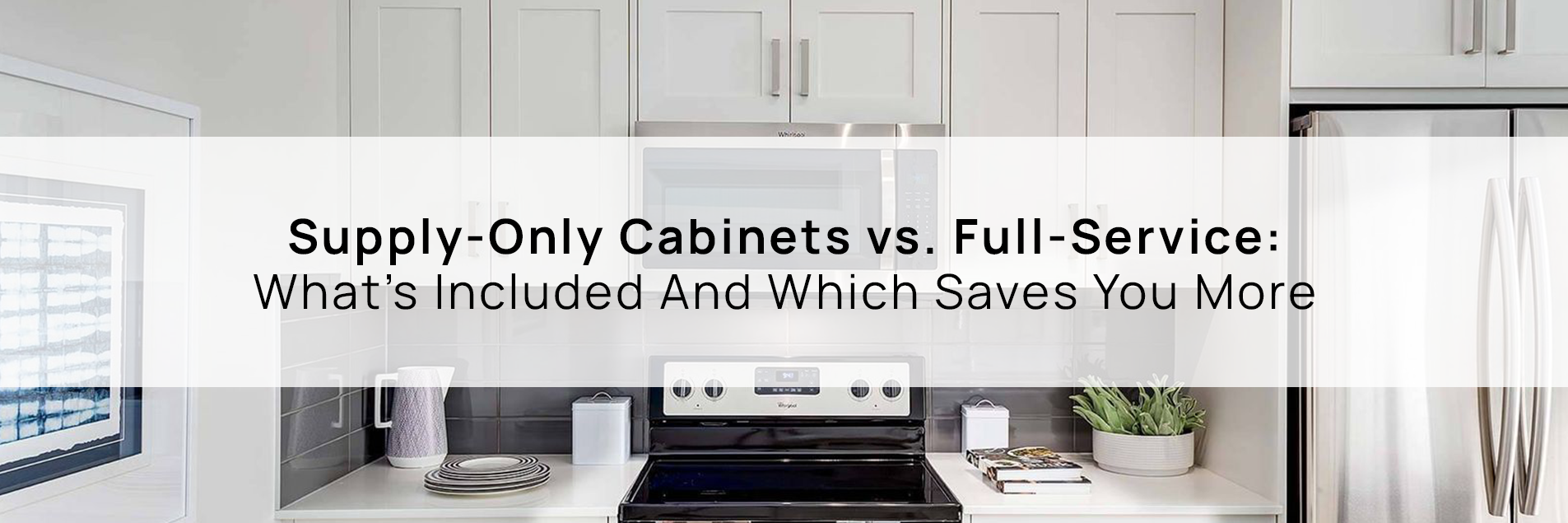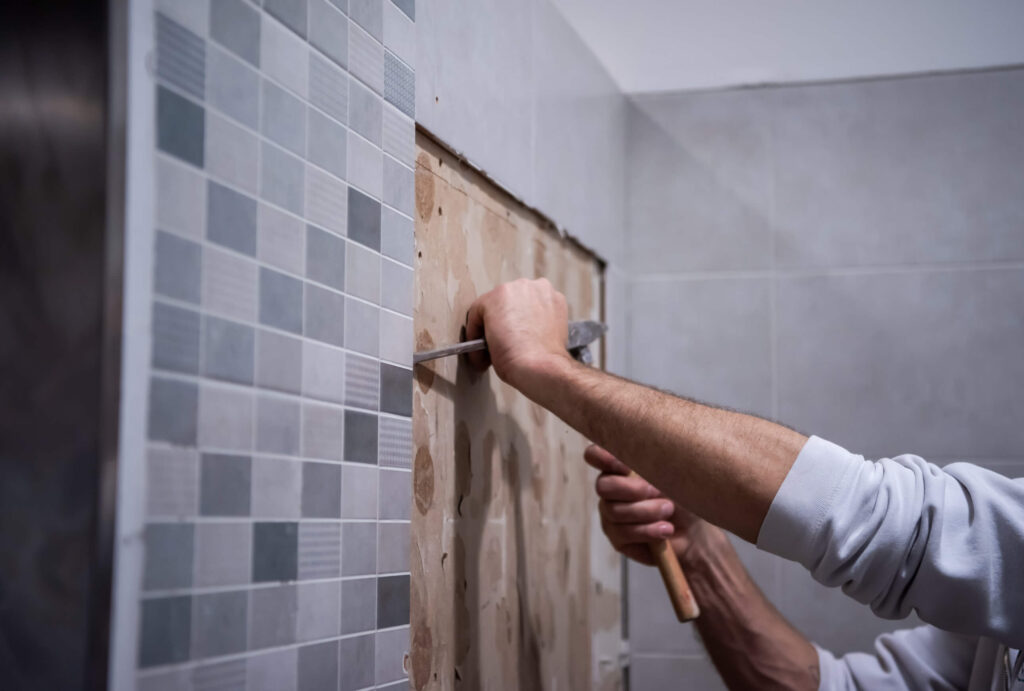
Demolishing Old Tiles in a Bathroom Renovation
1. Water Damage and Mold Growth
Water damage and mold growth are serious issues that can not only compromise the structural integrity of your bathroom but also pose health risks to you and your family. Keep an eye out for signs such as peeling or bubbling paint, warped or stained walls and floors, and a musty odor, as these could indicate hidden moisture problems. Mold thrives in damp environments, so areas around sinks, showers, and toilets are particularly susceptible. If left unchecked, mold can spread rapidly and may require professional remediation to eradicate completely. Addressing water damage promptly by fixing leaks, improving ventilation, and sealing grout and caulk can help prevent mold growth and preserve the health and beauty of your bathroom.
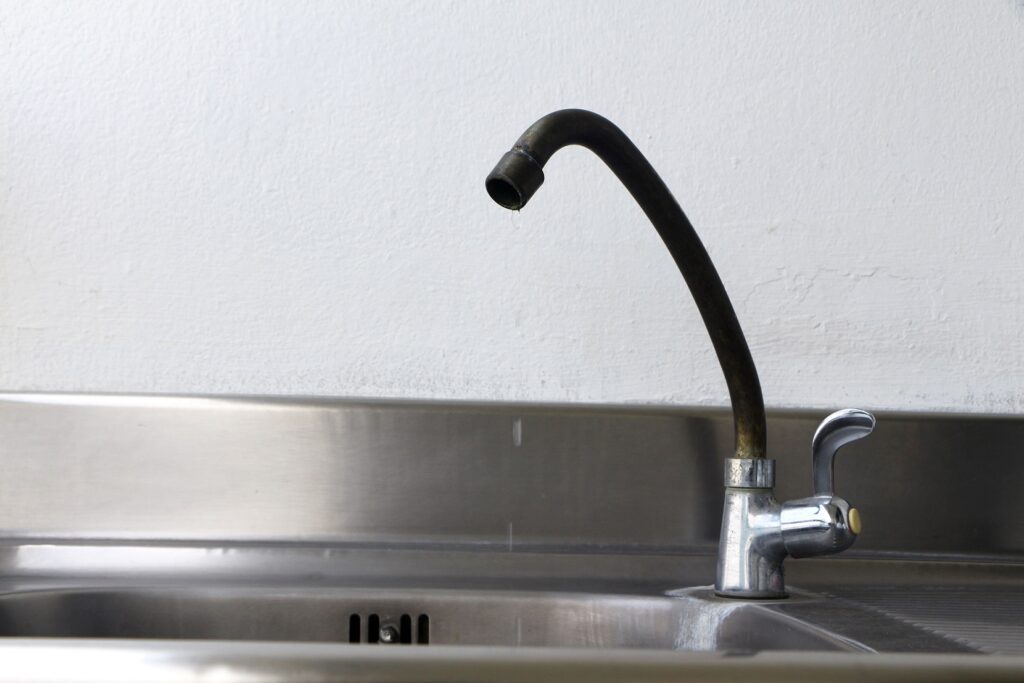
Rusted and Leaking Faucet
Read more: Choosing the Right Size for Your Calgary Kitchen Sink
2. Outdated Fixtures and Finishes
Your bathroom’s fixtures and finishes play a significant role in its overall appearance and functionality. If your bathroom feels stuck in a bygone era with avocado-coloured tiles or brass fixtures, it may be time for a refresh. Updating your fixtures, such as faucets, showerheads, and hardware, to contemporary styles can instantly modernize your space and enhance its aesthetic appeal. Similarly, replacing worn or outdated finishes like countertops, cabinets, and flooring with newer materials can transform the look and feel of your bathroom. Consider opting for timeless designs and high-quality materials that will withstand the test of time and provide lasting enjoyment.
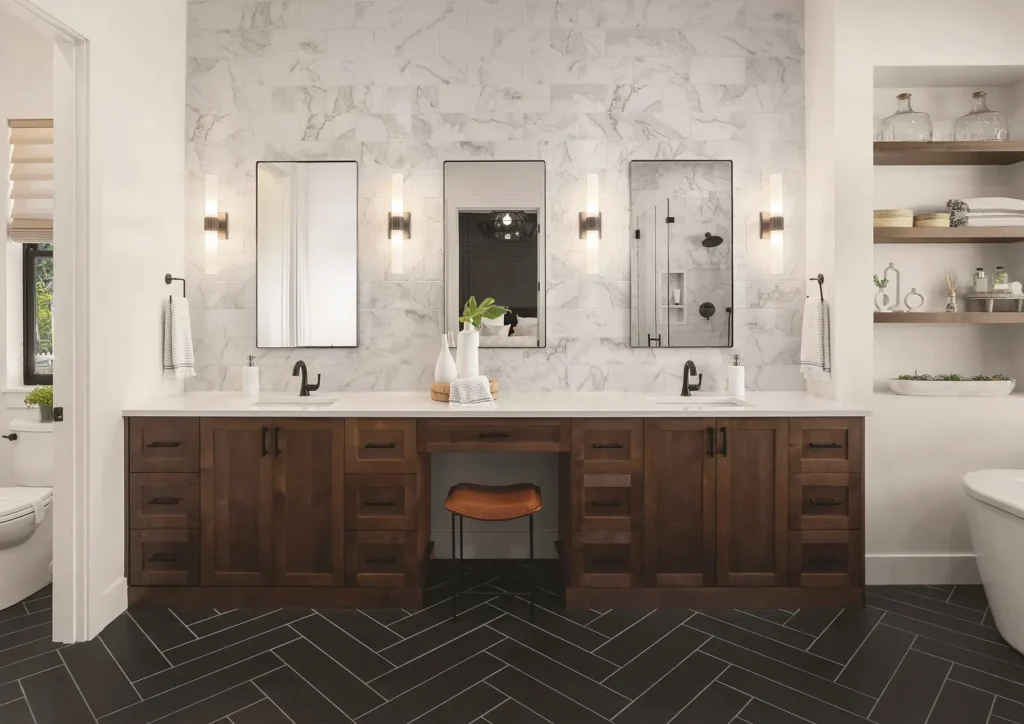
Retro Bathroom
3. Lack of Functionality
Functionality is key in any bathroom space. If you find yourself struggling with the functionality of your bathroom, it may be a sign that renovation is necessary.
Here are two common issues:
Insufficient Storage Space
A lack of storage space can lead to cluttered countertops and difficulty keeping your bathroom organized. If you find yourself struggling to find adequate space for towels, toiletries, and other essentials, it may be time to consider adding storage solutions during your renovation. Options such as built-in cabinets, shelves, and vanity units can help maximize storage space and keep your bathroom tidy and functional.
Poor Layout
The layout of your bathroom can significantly impact its usability and comfort. A cramped or awkward layout can make it difficult to navigate the space efficiently and may lead to wasted space or functionality issues. If you find yourself constantly bumping into fixtures or struggling to access essential areas of your bathroom, it may be worth considering a layout redesign during your renovation. A well-planned layout can optimize space, improve flow, and enhance the overall functionality of your bathroom.
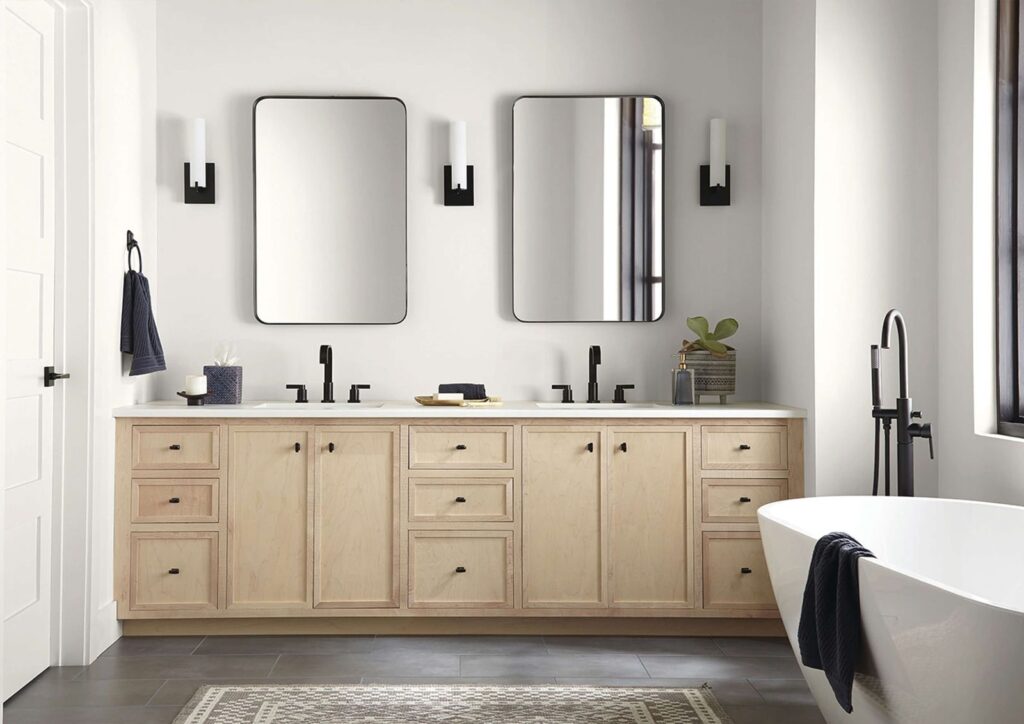
Bathroom Layout Example
Read more: Exploring the Top 5 Bathroom Vanity Features
4. Deteriorating or Hard-to-Clean Surfaces
The surfaces in your bathroom, such as countertops, tiles, and flooring, endure daily wear and tear from moisture, cleaning products, and general use. Over time, these surfaces may become damaged, stained, or difficult to clean, detracting from the appearance and cleanliness of your bathroom. Signs of deteriorating surfaces include cracks, chips, stains, and grout discolouration. If your surfaces are showing signs of wear and are no longer easy to clean or maintain, it may be time to consider replacing them during your renovation. Choosing durable, low-maintenance materials can help ensure your bathroom surfaces remain beautiful and easy to care for over time.
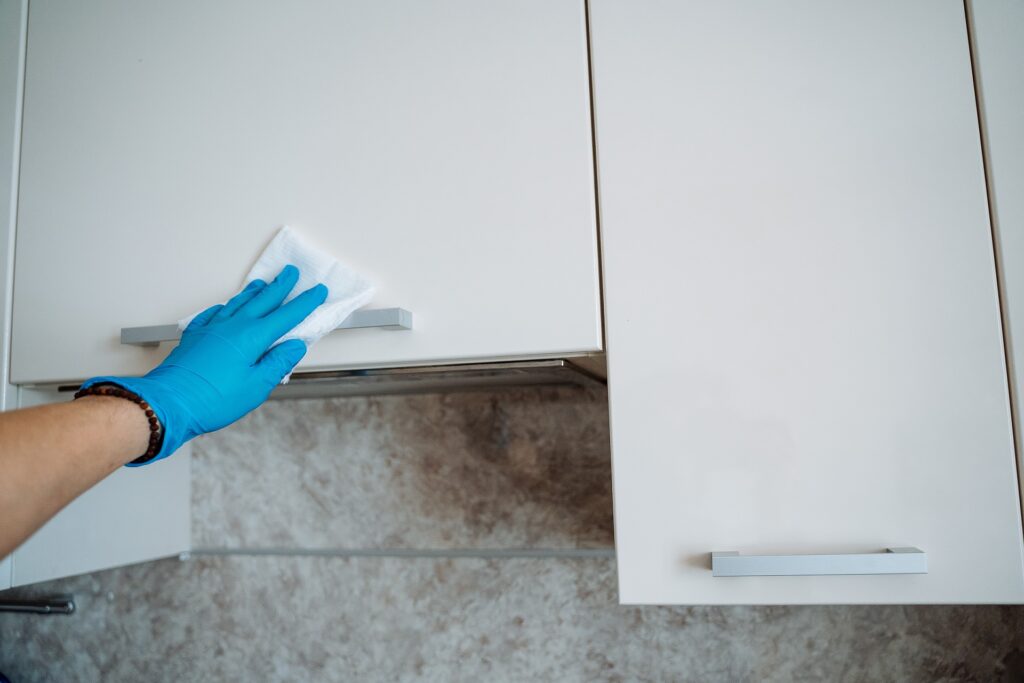
Care, Cleaning and Deterioration
5. Safety Hazards
Ensuring the safety of your bathroom is paramount to protect yourself and your loved ones from potential accidents and injuries. Over time, certain aspects of your bathroom may deteriorate or become outdated, posing safety hazards if not addressed promptly. Here are some signs that your bathroom may have safety concerns:
- Slippery Surfaces: Worn-out or improperly installed flooring and bathtub surfaces can become slippery when wet, increasing the risk of slips and falls.
- Loose Fixtures: Loose towel bars, grab bars, or showerheads can pose a danger, especially if they fall unexpectedly.
- Inadequate Lighting: Poor lighting can make it difficult to navigate the bathroom safely, particularly during nighttime visits.
- Lack of Grab Bars: Grab bars provide support and stability, especially for individuals with mobility issues or seniors, and their absence can make it challenging to enter or exit the bathtub or shower safely.
- Sharp Edges: Broken or chipped tiles, countertops, or fixtures can have sharp edges that pose a risk of cuts or injuries.
If you notice any of these safety hazards in your bathroom, it’s essential to address them promptly to prevent accidents and ensure a safe environment for everyone.
6. Changing Lifestyle Needs
As your lifestyle evolves, so do your needs and preferences for your bathroom space. What once worked perfectly for you may no longer meet your current requirements. Here are some signs that your bathroom may no longer align with your lifestyle:
- Family Growth: If your family has grown or if you’re expecting a new addition, your bathroom may need to accommodate additional users, storage space, or safety features.
- Accessibility Needs: Changes in mobility due to aging, injury, or disability may require modifications such as barrier-free showers, wider doorways, or grab bars to make the bathroom more accessible.
- Functional Layout: A bathroom layout that once suited your needs may now feel cramped or inefficient, prompting the need for a redesign to improve flow and usability.
- Upgrade for Comfort: You may desire features such as a spa-like shower, heated flooring, or smart technology to enhance comfort and convenience in your daily routine.
By recognizing these changing lifestyle needs, you can plan a bathroom renovation that better reflects your current preferences and enhances your overall quality of life.

Father Baby Bonding
Read more: How to Get the Most Out of Your Bathroom Renovation
7. Increase in Energy Bills
Your bathroom’s energy efficiency can have a significant impact on your monthly utility bills. If you’ve noticed a sudden spike in energy costs, your bathroom may be contributing to the problem. Here are some reasons why your bathroom could be causing your energy bills to rise:
- Inefficient Lighting: Outdated or inefficient lighting fixtures, such as incandescent bulbs or fluorescent tubes, consume more energy than modern LED or CFL bulbs. Switching to energy-efficient lighting options can help reduce electricity usage and lower your energy bills.
- Older Appliances: Older bathroom appliances like exhaust fans, heaters, and heated towel racks may be less energy-efficient than newer models. Upgrading to energy-efficient appliances can help reduce energy consumption and save you money in the long run.
- Inadequate Insulation: Poor insulation in your bathroom walls, floors, or ceiling can lead to heat loss during the winter months, causing your heating system to work harder to maintain a comfortable temperature. Improving insulation can help retain heat and reduce energy waste.
- Leaky Fixtures: Leaky faucets, showers, or toilets can waste significant amounts of water and energy over time. Repairing or replacing these fixtures can help conserve water and reduce your water heating costs.
- Improper Ventilation: Inadequate ventilation in your bathroom can lead to moisture buildup, which can promote mold growth and cause your HVAC system to work harder to maintain indoor air quality. Installing a properly sized and efficient ventilation fan can help remove excess moisture and improve energy efficiency.
If you suspect that your bathroom is contributing to an increase in your energy bills, consider consulting with a professional to assess your energy usage and identify opportunities for improvement during your renovation.
To get started, simply fill out our form for a free consultation, or you can give us a call at (587) 840-7934 for a bathroom renovation estimate. Our team at Zen Living Kitchen & Bath is eager to work with you and hear all about your project ideas. We are dedicated to turning your vision into a reality.


